I sold my Nexus 7 and I don't miss it

Over the weekend, I sold my beloved Nexus 7. As BetaNews readers may be aware, the tablet has given me some trouble over the last year. I had complaints with the pre-order process and the tablet's performance. However, despite these complaints, I enjoyed the tablet very much. I definitely got my use out of it -- I used it to watch TV, read magazines and access social media like Twitter and Google+.
However, while I loved the Nexus 7, I heard rumors that a next-generation Nexus 7 was soon to be announced. And so, I sold my cherished tablet on Craigslist while it still had value -- there will likely be a fire sale once the successor is announced. I expected to take the money from the sale and put it towards a new tablet. I really wanted a Galaxy Note 8.0 but decided to wait for Google’s next Nexus tablet announcement. Waiting proved to be the right choice.
Nexus 7 dock review
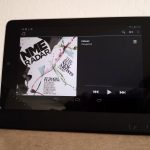
Accessories can make a portable device better. If you own the ASUS-manufactured, Google-branded Nexus 7 tablet, surely there is a case protecting it; sometimes, anyway. Some can prop the tablet, but there's another option. Can a dock improve the user experience and even extend the utility? That's what this quickie review seeks to answer.
The Nexus 7 dock is the official issue, made by ASUS, and sold from Google Play for $29.99. I ordered mine in late January, for $39.99, from B&H Photo, back when only third parties carried the accessory. Since then, the retailer dropped the price by five bucks. B&H took my order when the dock was out of stock, but shipped 8 days later. If you want this thing, don't be deterred by availability elsewhere but forget Google Play, which isn't taking orders as I write. Expect to spend more elsewhere. By the way, I would have waited and paid less, had I known better.
Jelly Bean closes in on Ice Cream Sandwich
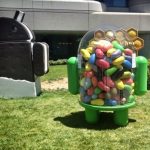
Jelly Bean may be the newest sweet in the family, but it is steadily gaining ground against its older brothers. Combined, Android 4.1 and Android 4.2 reached a 25 percent distribution level in the green droid realm, based on the number of devices accessing Google Play during the 14 days ending April 2.
Starting this month, Google has decided to alter how the data is collected. Google says: "Beginning in April, 2013, these charts are now built using data collected from each device when the user visits the Google Play Store. Previously, the data was collected when the device simply checked-in to Google servers". Why? Because the company considers the new collection method to be more accurate and that it best represents "users who are most engaged in the Android and Google Play ecosystem".
Google I/O sells out
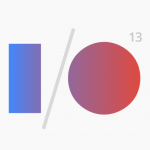
Blink and you missed it. Registration for Google's developer conference opened at 10 a.m. EDT this morning and sold out fast. With so much candy to offer -- Android Key Lime Pie, Chromebook Pixel, Glass and Google Now -- I'm not exactly surprised. Google I/O 2012 was big, and this year's event promises to be even bigger. I got the "Google I/O is sold out" on the registration page around 10:48 a.m.
Google charges $900 for general developer admission and $300 for students or school faculty. The event takes place in San Francisco from May 15-17. Considering the goodies Google gives attendees, some people might sign up just for the hope of free Glass or Pixel (don't hold your breath). Last year, attendees got Galaxy Nexus, Nexus Q and Nexus 7. Oh yeah, Train performed live.
Is Android 4.2 killing your Nexus' battery life?
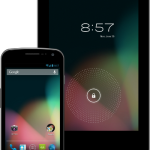
My joy at receiving Nexus 7 32GB HSPA as a day-after-Christmas present turned to deep disappointment just two weeks later. Google replaced the device, and a second runs down the battery in about 15 hours, whether sitting idle or actively used. Near as I can tell, and others share my problem, Android 4.2 is root problem. My woes with the replacement tablet started with the point-two update, while others suffering similar misery report troubles with 4.2.1. Google really needs to fix this problem. Fast.
I wasted many hours troubleshooting. The prescribed fix is restore and reset, which I've done about a half-dozen times. No change. Perhaps the cellular radio drains the battery fast. I removed the SIM. No change. Maybe one of my apps keeps Nexus 7 from going idle. I restored and set up with my wife's Google account. No change. The battery app consistently lists the "screen" as top consumer, which suggests something prevents the tablet from going idle. Last night, I charged up. Nine hours and thirty-minutes later, there is 45 percent charge. At that rate, I'll set a new record: 16 -- maybe even 17 -- hours to zero. What a lucky day this is.
What Google Play's first birthday means to you

One year ago, March 6, 2012, Google renamed Android Market, and nothing is the same sense. The rebranded Google Play pushed forward a transition started in November 2011, with the broad expansion of content beyond apps. The name change also represented something bigger, shift in emphasis away from broader Android to the search giant's siloed services and brands. Google sought to imitate Apple while tackling wild Amazon.
On Play's first birthday, Google Android -- not the skinned software Amazon, HTC, LG, Samsung and others ship -- is a 98-pound weakling gone super steroids. The Mountain View, Calif.-based company sells apps, ebooks, gift cards, magazines, music, movies, TV shows and devices through the online store. There were no devices available a year ago, but now accessories, Chromebooks, smartphones and tablets. Three different computers are available, including the new and Google-branded Chromebook Pixel. Also: Two different Nexus 4 smartphones and Nexus 10 tablets and three Nexus 7 slates -- four if counting 32GB HSPA+ models twice, with different cellular SIMs.
Ubuntu Touch -- interesting concept that needs work [preview]
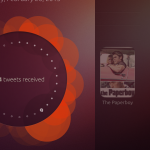
The concept of Canonical taking a stab at the mobile market eludes me. Unless we want to split hairs, which I know will happen, Android already is the Linux ambassador across the globe, so why would the world need Ubuntu Touch? Furthermore, any new player starts out with a clean slate, which means many consumers will be skeptical at purchasing devices running the new operating system and therefore developer interest does not surpass a low threshold.
The PC market is not what it used to be a couple of years ago when people rushed out to buy new computers, rather than tablets or smartphones first. In some ways Canonical right now is Microsoft before Windows Phone and Windows 8 -- an important player further heading into obscurity down the road unless the boat steers in the right direction. Ubuntu Touch is supposed to give the world a breath of fresh air, the X factor that would sway enough people into switching from Android, iOS, Windows Phone or a feature phone, even.
Tech toys I love more than my wife (but don't tell her)

Valentine's Day is all about romance, but whom -- or what -- do you really love? The stereotypical geek fawns over his or her gadgets and spends hours on PC (smartphone or tablet) instead of being with family or friends. Surely that describes you, and me, for that matter.
On this day of Cupid's arrows, I confess where they struck gadgets and other goodies and bound us in everlasting love. Take my wife, please, but leave my tech toys. She'll understand -- ah, right?
Android 4.2.2 rolling out for Nexus devices
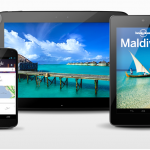
Google Nexus owners, unlock your devices and start checking for updates because Android 4.2.2 Jelly Bean is now rolling out. The latest software version is reportedly hitting Galaxy Nexus, Nexus 7 and Nexus 10 devices, with no word at the moment relating to the Nexus 4.
The Android 4.2.2 update bumps up the build number to version JDQ39 and mostly appears to contain minor fixes. No official changelog has been provided by Google at this moment, but users are reporting improvements for Bluetooth streaming which now presents "less hicups [...] but still not perfect" with apparent disconnects when switching from Wi-Fi to cellular data.
Google shares rise on 2012 results

Investors rewarded Google today, pushing shares up close to 6.5 percent soon after the opening bell and staying in that range. At 12:09 PM EST, the stock traded at $748.23, up 6.45 percent. Google opened at $735.83, up from yesterday's $702.87 close.
After the closing bell, on January 22, Google delivered fourth quarter and 2012 results that clearly satisfy someone. For the year, Google revenue reached $50.18 billion, up 32 percent from $37.9 billion in 2011. Motorola contributed $4.14 billion. Net income: $10.74 billion or $32.81 earnings per share. Average analyst consensus was $41.41 billion revenue and $39.73 earnings per share. Oh, the wiles of investors. Yearly EPS missed the Street, as it did for the quarter.
Google Q4 2012 by the numbers -- $14.42B revenue, $8.62 EPS

Today, I formally begin covering Google earnings, as I have done for Microsoft (a decade) and Apple (about six years). This first report won't be as thorough as the others, as I get my head around the financials, which share little in common with APPL and MSFT other than money. Today's earnings announcement is refreshing respite from third quarter's, when an incomplete press release pushed out early and while the market was open.
For calendar fourth quarter, revenue rose 36 percent to $14.42 billion, year over year; net revenue, excluding Traffic Acquisition Costs, was $9.83 billion, up from $8.13 billion. Net income climbed to $2.89 billion up from $2.71 billion. That's $8.62 earnings per share, including costs associated with discontinued operations. Operating income was $3.39 billion, down from $3.51 billion year over year.
CyanogenMod 10.1 M1 -- first monthly release -- is available
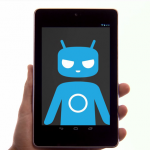
Keeping up with recent CyanogenMod tradition, the team behind the popular green droid custom distribution unveiled the first monthly release based on Android 4.2 Jelly Bean. The build is designed to offer users a stable experience, more suitable for daily use compared to the usual nightly builds.
CyanogenMod 10.1 M1 is currently available only for a limited number of devices, including the Google Nexus lineup (Nexus S, Galaxy Nexus, Nexus 7 including the 3G variant, Nexus 4 and Nexus 10), the US variants of the Samsung Galaxy S III, the Samsung Galaxy S (codename "galaxysmtd" and "galaxysbmtd"), the Samsung Galaxy Tab 2 7.0 (versions P3100 and P3110), the Samsung Galaxy Tab 10.1 (versions P5100 and P5110) as well as the Hardkernel ODROID U2 open development platform.
Nexus 7 HSPA+ now comes with T-Mobile SIM
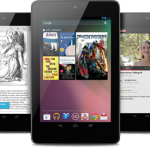
What interesting timing. Earlier today, I wrote about my very good experience exchanging a defective Nexus 7 HSPA+ at Google Play. My unit came with an AT&T SIM, but I pointed out the device also supports T-Mobile's data network. Either I missed, or Google Play added later today, an option to get a T-Mo SIM, too. Price is same for both: $299 plus tax (if applicable) and shipping.
Nexus 7 by far is my favorite tablet, by just about every measure: Performance, comfort in the hand, portability and all-around usefulness for consuming content and communicating (my preferred device for email social networking).
Sorry, Apple Store, Google Play device customer service rocks
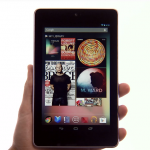
I often hear "Apple Store" stated as reason someone chooses iPad over another tablet. The Genius Bar is there for troubleshooting and even replacing defective products. Where do you take Android? It's a valid question, and I can personally attest to amazing Apple customer service. In 2008 and 2011, I had two different MacBook Airs fail. As in dead. I walked out of the local shop with brand new computer each time. That's hella good, eh?
That said, over the last decade, I've only ever exchanged Apple products -- no failures from any other manufacturer (there was fast battery discharge from a Samsung phone, but we kept it). Well, until last week. My 32GB Google Nexus 7 HSPA+ stopped working. No amount of troubleshooting or fancy pressed-key combinations could rivive it. I prepared for the worst, expecting that Google, operating on the Internet, could never give good retail customer service. Was I ever wrong. Apple couldn't have done better.
Which size tablet is right for you?

There is no shortage of new tablets being announced at this week's Consumer Electronics Show -- Acer Iconia B1-A71, Polaroid M7 and M10 and VIZIO 11.6" Tablet PC, among many others. Meanwhile, NPD DisplaySearch forecasts that global tablet shipments will surpass notebooks this year. But what's interesting is a dramatic shift in size preference, which is why I want to know: Which is right for you?
DisplaySearch predicts that tablets with 7-to-8 inch screens will overwhelmingly dominate the market, with 45 percent share. Meanwhile, 9.7 inches -- the size Apple popularized with iPad -- will fall to just 17 percent share. Yet many of the slates debuting at CES are in the larger categories, typically between 10.1 and 11.6 inches. Does size really matter that much, and is smaller better?
Recent Headlines
Most Commented Stories
BetaNews, your source for breaking tech news, reviews, and in-depth reporting since 1998.
Regional iGaming Content
© 1998-2025 BetaNews, Inc. All Rights Reserved. About Us - Privacy Policy - Cookie Policy - Sitemap.